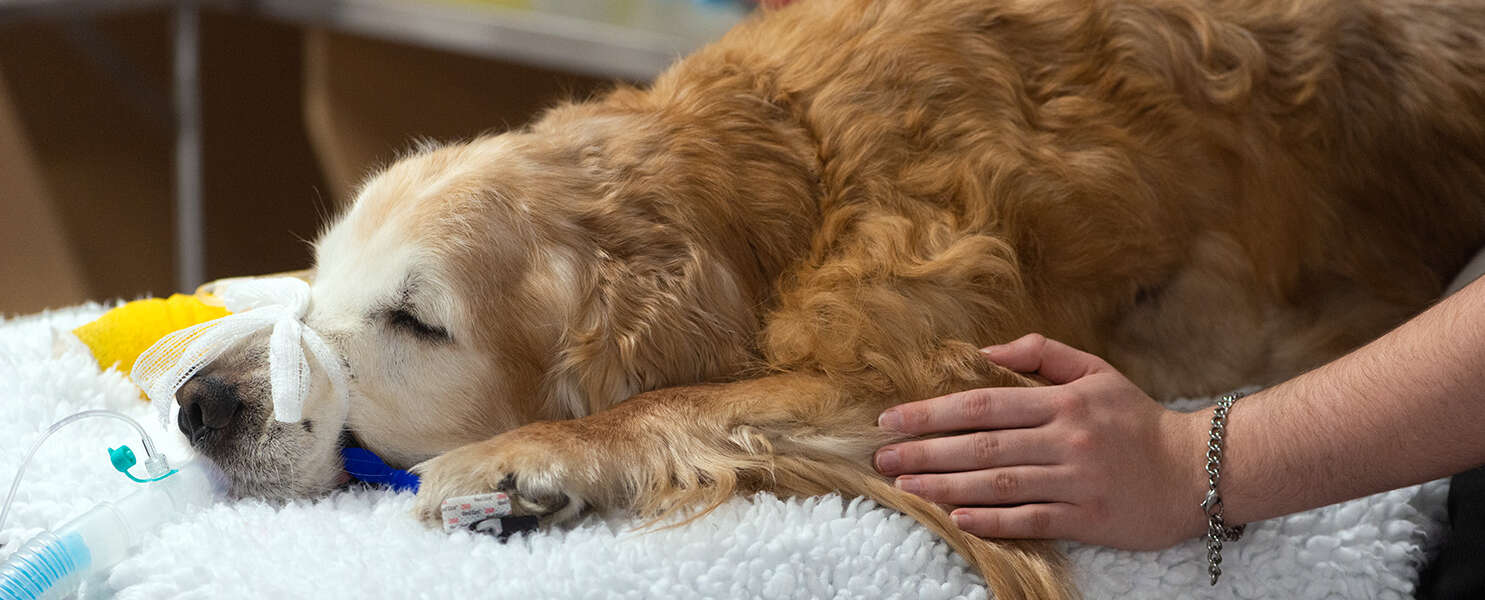Helping pets live longer, healthier lives is the goal of new leading-edge surgery and anesthesia facilities at the University of Guelph’s Ontario Veterinary College (OVC).
Supported in part by a $23-million infrastructure renewal investment from the province of Ontario, the facilities are the result of a successful $9-million fundraising campaign led by OVC Pet Trust.
“The newly opened, modernized facilities allow pets and their owners to benefit from medical advancements, innovative treatments and research, and permit students to receive an exceptional medical education,” said Dr. Jeff Wichtel, OVC dean.
As a veterinary teaching hospital, OVC provides educational opportunities for veterinarians-in-training. Teaching at the college focuses on integrating clinical research and evidence-based care to improve the diagnosis, prognosis, monitoring, treatment and comfort of patients. In these new facilities, students and trainees will learn and practise medicine with the most advanced and innovative tools available, said Wichtel.
“Reaching this milestone is a remarkable achievement on many levels. This success is due to the hard work and commitment of OVC’s faculty and staff and the many dedicated OVC Pet Trust supporters.”
 The extensive upgrades to the OVC Companion Animal Hospital allow the University to remain at the forefront of veterinary medical care, training and discovery and will support current and future international accreditation of OVC’s program.
The extensive upgrades to the OVC Companion Animal Hospital allow the University to remain at the forefront of veterinary medical care, training and discovery and will support current and future international accreditation of OVC’s program.
OVC ranks No. 1 in Canada, third in North America and fifth worldwide for veterinary science and is known for solving complex health issues in companion animals.
The new surgery and anesthesia facilities incorporate multiple medical specialties, enhancing OVC’s ability to manage serious illnesses that require complex surgeries or treatments. In the past year alone, OVC veterinary specialists and trainees managed more than 21,000 visits for companion animals referred by veterinarians for thousands of advanced diagnostic and surgical procedures.
About 90 per cent of patients treated at OVC have serious illnesses such as cancer, heart disease and liver failure; about half require surgery and the use of anesthesia.
“OVC has long been a leader in veterinary discovery that pushes the boundaries of innovation in pet care to improve the prevention, diagnosis and treatment of diseases in companion animals,” said Dr. Stephanie Nykamp, OVC associate dean, clinical program.
New facilities include:
The James Slaight Advanced Surgical Complex
- built with the support of a $2.5-million donation from La Fondation Emmanuelle Gattuso, includes operating rooms with advanced biosecurity and infection control, which will enable OVC to provide the highest standard of care for both routine and advanced surgical procedures.
The Kim and Stu Lang Anesthesia and Pain Management Unit
- supported by a $1.5-million donation from the Angel Gabriel Foundation, is a designated space for anesthetizing patients, administering pain medications, preparing for surgery and monitoring high-risk patients.
The Lindy Barrow Minimally Invasive Procedures Suite
- made possible by a $1-million donation, is the first of its kind in Canada and includes computer-controlled technology and equipment allowing pets to avoid major abdominal or thoracic surgery, leading to faster recovery.
The Stone Endoscopy Unit
- named after former OVC dean Dr. Elizabeth Stone and was made possible by a $500,000 gift from the estate of long-time donor Mona Campbell. This space is dedicated to endoscopic procedures and equipment.
The John and Jean Waller Anesthesia Recovery Room
- a controlled post-operative environment, supported by a $500,000 gift from the estate of John and Jean Waller.
“These new facilities will have a lasting impact on the health outcomes of our patients and on the training of future generations of veterinary practitioners and specialists, who will go on to offer the best care to pets in communities across Canada and around the world,” Wichtel said.
OVC Pet Trust is Canada’s first charitable fund devoted to the health and well-being of companion animals. Established in 1986, it has raised more than $45 million to support companion animal research, learning and care at OVC, including the creation of the new surgery and anesthesia facilities and the Mona Campbell Centre for Animal Cancer, the first centre of its kind in Canada.
OVC Pet Trust also provides funding for a range of specialty trainee graduate positions. Donations made through its Pet Memorial Program support faculty research, projects and equipment to advance veterinary knowledge in companion animal care.
“OVC Pet Trust’s core mission is to support the unique bond between animals and people by improving and advancing pet health and well-being,” said Kim Robinson, director of OVC Pet Trust.
“The improvements to the OVC Companion Animal Hospital ensure pets can receive life-saving procedures with fewer complications and faster recovery times, allowing people and their pets to be together for longer.”
